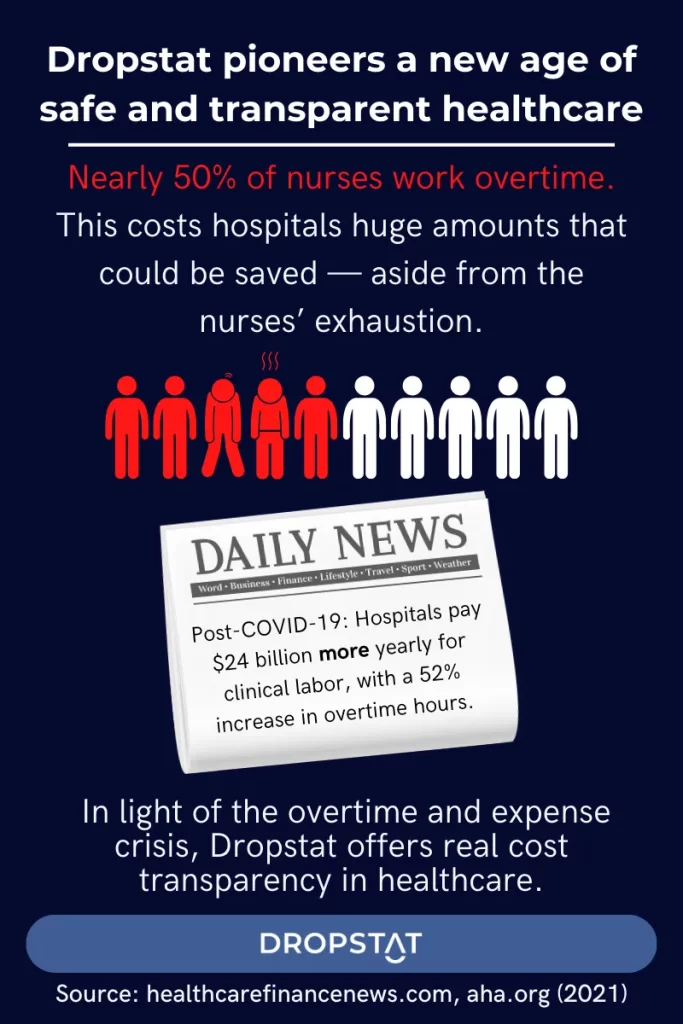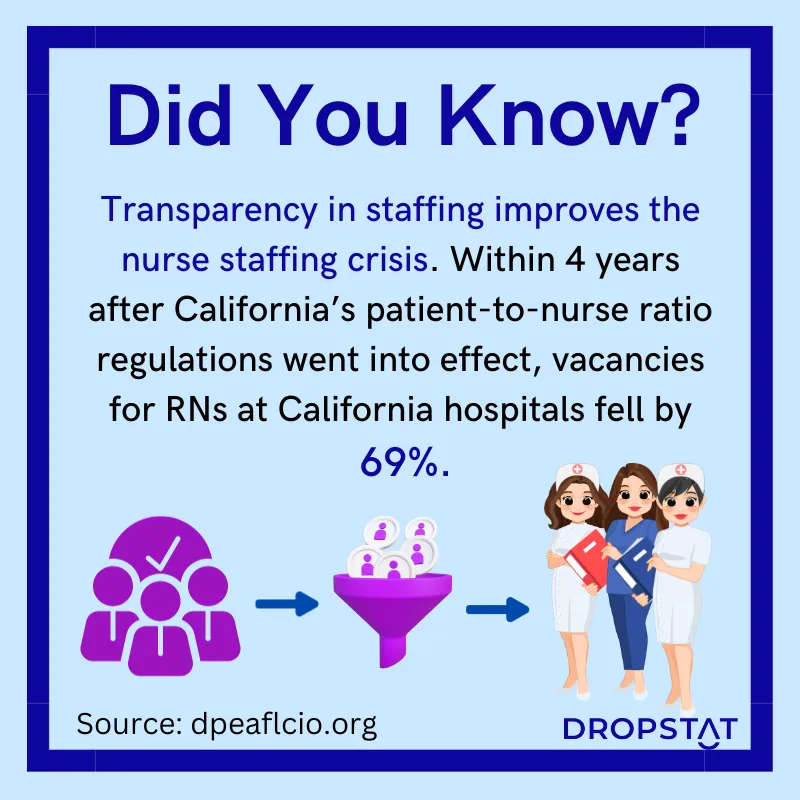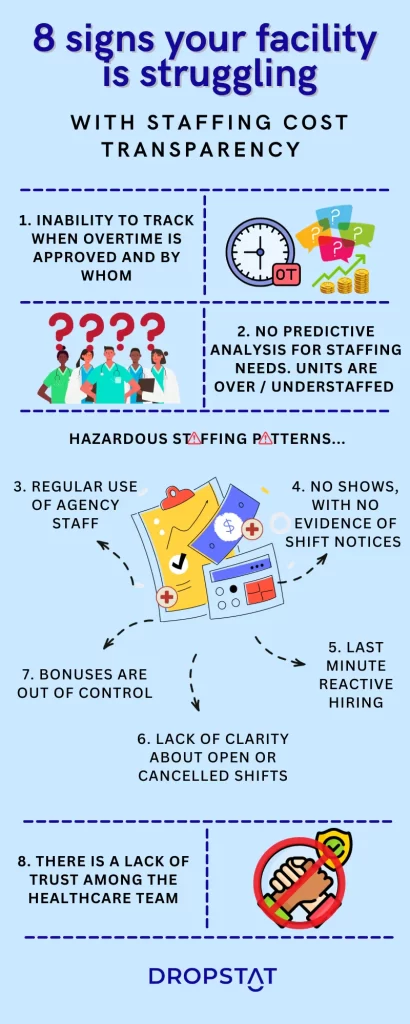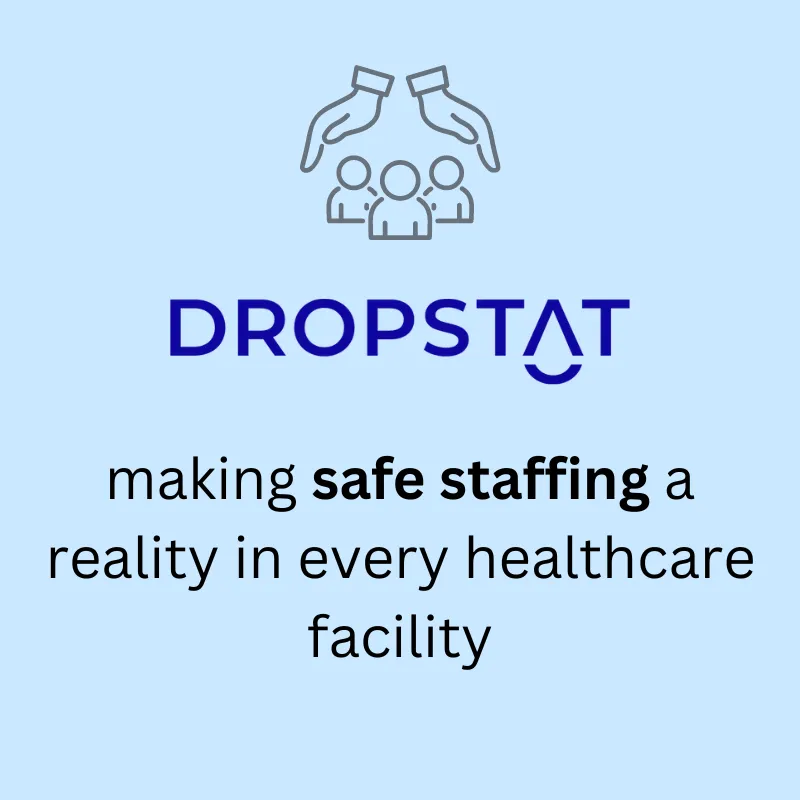How Dropstat coins the term transparency in healthcare
While the traditional definition of healthcare transparency refers to granting patients knowledge of pricing for medical treatments, tests, and other services, Dropstat has taken this concept to new heights. Dropstat has given new meaning to “healthcare transparency” by emphasizing greater insight into healthcare staffing.
Navigating the terrain of healthcare and labor shortages can be daunting, especially without the correct tools to point you in the right direction. The threats of vague healthcare practices include unsustainable workforce costs, unsafe staffing, low employee satisfaction, and inefficient operations. Fortunately, implementing strategies to increase transparency by gathering facility-specific information to make more effective decisions is an all-encompassing approach to simplifying your facility’s operations. It also reduces obstacles on your path to delivering safe, high-quality healthcare.
The insights that Dropstat offers ultimately enable your facility to make data-driven staffing decisions that create safer, more accountable, and cost-effective work environments that strengthen and simplify your staffing practices. Most importantly, it also offers a greater awareness of operational data that has never been available before. Dropstat’s ability to synthesize large amounts of facility data into a user-friendly dashboard allows your team to have more oversight than ever before.
How Dropstat is pioneering a new age of safe and transparent healthcare
Dropstat’s revolutionary workforce management software is a breakthrough in the current climate of extreme nursing shortages and egregious overspending. Unlike other scheduling software, Dropstat uses predictive analytics to forecast shift requirements and track details about specific shifts, which leads to greater transparency for both schedulers and nurses.

The novel ability to tag shifts according to overtime while monitoring bonuses and staff cost-tagging are a few state-of-the-art features that Dropstat provides to offer more transparency through a holistic understanding of a facility’s workforce. These features have led to immense organizational savings, avoided nurse burnout caused by overtime, and supported more safe and effective scheduling practices.
Dropstat Case Study #1:
One major obstacle for healthcare leadership teams is the ability to track and verify the details of each shift. This shortage of discernible information often leads to a lack of trust among the healthcare team, as well as last-minute, costly staffing decisions
Embrace a new method to support better patient outcomes and increase trust between your healthcare teams. Providing your facility with a safety net to access vital shift details for previous shifts opens the door to countless opportunities to avoid negligent and ineffective practices while cultivating a sense of confidence and reliability among your staff.
Dropstat has designed a comprehensive log to monitor many crucial aspects of scheduling, including:
- The exact date and time that staff members were approved for shifts
- When shifts were canceled or reopened
- When new staff members were added to the platform
- Updates to the census
- Staff PTO
- Added bonuses
- Updated staff schedules
- Staffing requirements for a shift
When multiple staff members at one facility were being assigned PTO, Dropstat was able to determine what had led to this and how it could be mitigated moving forward. Utilizing the log feature, which records the day and time the PTO was assigned, helped the facility determine that one scheduler was using another’s log-in credentials to assign PTO for different nurses without their knowledge.
Ultimately, the facility was able to track down who was responsible. This feature helps avoid dangerous clinical environments by ensuring that departments are properly staffed and that schedulers are aware of the nurses who will be working each day.
Additionally, some facilities have experienced no-shows who claim they were not approved for a shift. However, the logs for that facility were able to provide clear evidence of the day and time specific staff members were approved and notified about the shift. This ensures that staff members are held accountable for the shifts that they miss and that facilities can have greater insight into their staffing techniques, including how far in advance staff members are approved or canceled.
In addition, this feature also reduces extreme healthcare spending by promoting financially responsible and patient-centered scheduling practices.

Dropstat Case Study #2: Bonus and OT tagging:
- Another blind spot that administrators struggle with is unregulated bonuses and overtime. Acting as a magnifying glass into the inner workings of a facility, the log feature also provides insight into bonuses, including who they’re given to, the amount offered, and when they were offered, which allows administrators to understand bonus trends better and minimize bonus usage. For example, facilities that offer bonuses long before a shift start date will likely experience higher costs associated with bonuses. However, if the facility only offers bonuses closer to the start of a shift, it may be able to increase the number of staff members who pick up a shift without a bonus.
- In addition, the shift tags on the staff and master schedule detect overstaffed, understaffed, and safely staffed shifts, as well as staff members who are working overtime, which allows facilities to cut costs as a result of overstaffing and overtime. One facility using Dropstat was able to save $43,360 on overtime in less than one year by utilizing the cutting-edge methods deployed by Dropstat to promote transparency and ensure compliance with mandated staffing ratios. Another facility saved over $5,000 associated with overtime staffing in a single month.
- Similarly, a comprehensive understanding of your facility’s weekly or monthly schedule and the shifts that are either understaffed or overstaffed can illuminate the road to optimal staffing, which lowers the cost of labor for a facility.

Benefits of healthcare transparency
Infusing a healthcare organization with more transparent staffing practices will set the foundation for:
Delivering high-quality healthcare
When schedulers and administrators have the insight and capability to optimize staff schedules, patients are met with providers who feel supported by other members of the healthcare team and are capable of meeting the demands of patient volumes.
Improving organizational culture
A healthcare environment built on transparent staffing methods strengthens the health system by promoting responsibility from one provider to another and ensuring that each staff member is receiving equal treatment in terms of bonuses, shift times, and pay according to their position. That is why Dropstat has built a platform based on the premise of transparency, which leads to safer patient care.
Greater retention
As a result of more organized, flexible, and safe staffing procedures, your clinical staff has the assurance that they will not be overburdened with patient volumes and that they will not need to neglect their personal responsibilities. This results in less nurse burnout and greater retention, which contributes to a better workplace culture and reduced turnover.
How does transparency in healthcare scheduling impact patient care and promote safe staffing?
When your nurses know that they are working in a safe and fair clinical environment, they are better equipped to manage their workloads with the reassurance that their team will be able to support them. Additionally, transparent scheduling gives your facility the knowledge of which shifts are understaffed or overstaffed and enables facilities to make data-informed decisions for better workforce management.
Conclusion
Understanding the methods that healthcare institutions can implement to increase transparency in their operations is crucial to decreasing the risks associated with poor healthcare delivery, institutional turnover, and, most importantly, the healthcare labor shortage. Dropstat focuses on these aspects of transparency and provides organizations with all of the necessary tools to reform their operations and create safer work environments that support retention and efficient operations.







